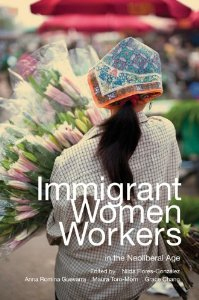Professor of Sociology Maura Toro-Morn is delving into the plight of immigrant women as co-editor of a new book, Immigrant Women Workers in the Neoliberal Age.
The book examines the “informal economies” where immigrant women tend to find employment. “We’re seeing a lot of undocumented women working in occupations that are not well regulated, and therefore easily exploited,” said Toro-Morn, citing areas such as domestic work and street vending. The book focuses on challenges immigrant women face, as well as advocacy initiated by community groups.
For the book, Toro-Morn contributed a chapter on Elvira Arellano, who captured national attention when she spent a year in the sanctuary of a Chicago church to avoid deportation. Toro-Morn conducted several interviews with Arellano, who took up sanctuary in Chicago to avoid being separated from her U.S.-born son. She now advocates keeping families together through the organization Familia Latina Unida from Mexico.
“There is a growing question of what happens to the children – who are U.S. citizens – when the parents are deported,” said Toro-Morn, who is also the director of the Latin American and Latino/a Studies Program at Illinois State. She noted there are more than 200,000 children in Mexico who are U.S. citizens. “That is a huge drain of potential from U.S. soil. The process of deportation can also be traumatic for children who have lived in the U.S. for years and who are used to our standard of living.”
Toro-Morn’s chapter is part of her ongoing work about women’s increasing involvement in the globalization process through work and migration. “Globalization has accelerated women’s entrance into the labor market and has pushed women and families to leave communities of origin, creating significant shifts among families all over the world,” said Toro-Morn. “This is also a topic that permeates the classroom as I encourage students to think about the ways their lives, families and communities are also impacted by globalization processes.”
Toro-Morn’s next research project will follow the advocacy work of a group of Central American mothers whose children have disappeared making the journey to immigrate to the U.S. “Many young people, especially young men, disappear on their way here. Some die in the desert and their bodies are found with no identification. Others are accosted by ‘narcotraficantes’ and end up in unmarked graves that are now being discovered,” she said.
A group of Central American mothers are asking the Mexican government to create a DNA bank to help identify these bodies. While conducting research in Mexico this summer, she spoke with one mother whose only son vanished. Toro-Morn said, “This mother-turned-activist told me that she will not leave Mexico until she knows what happened to him. That is something every mother understands.”

